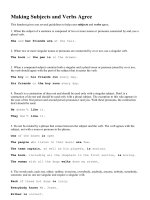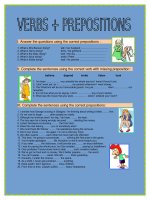EQUIVALENTS- MODALS- AUX VERBS
Bạn đang xem bản rút gọn của tài liệu. Xem và tải ngay bản đầy đủ của tài liệu tại đây (21.6 KB, 2 trang )
Page 1 of 2
www.englishpractice.com – Learn and practice English online.
Some equivalents of modal auxiliary verbs
Be able to
Be able to has similar meaning to can and could.
He is able to support her. (= He can support her.)
She is able to speak ten languages. (= She can speak ten languages.)
They were able to catch the thief. (= They could catch the thief.)
Be to
The structure be + to indicates simple future, like will or shall, but with a slight
degree of uncertainty.
He is to retire this year.
We are to go on a vacation next month.
Be + to can also be used to express commands. This structure has similar meaning
to must, but not quiet so strong or blunt.
You are to leave at once. (= You must leave at once.)
He is to report for duty within a week. (= He must report for duty within a week.)
Had better
Had better has similar meaning to should and ought.
You had better consult a doctor. (= You should consult a doctor.)
You had better get some rest. (= You ought to get some rest.)
Had better may also express a threat.
You had better give me my money back.
He had better be careful.
Have to and have got to
I have to be there by 12 o'clock. (= I must be there by 12 o'clock.)
Fill in the blanks with suitable modal auxiliary verbs.
www.englishpractice.com – Learn and practice English online.
Page 2 of 2
1. Pay your fees in time lest you ?????- be fined.
a) would
b) should
c) will
2.????- I send an application?
a) will
b) shall
c) may
3. ????? he be allowed to play the match?
a) shall
b) will
c) must
4. If I were you, I ????- do it.
a) wouldn't
b) shouldn't
c) must not
Answers
1. should
2. shall
3. will
4. wouldn't









